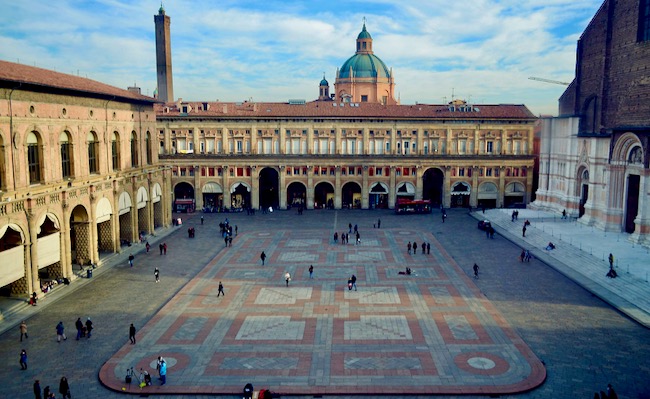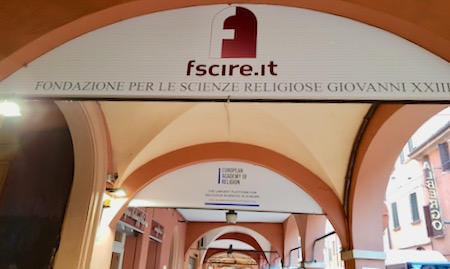IARJ and FSCIRE announce new Piazza Grande Religion Journalism Award for European and Mediterranean Journalists

BOLOGNA, Italy, March 3, 2019—The International Association of Religion Journalists (IARJ) and the Fondazione per le Scienze Religiose Giovanni XXIII (FSCIRE), an Italian research institute focused on religious studies, have joined forces to launch a new award for religion reporting, the Piazza Grande Religion Journalism Award. (FSCIRE’s website is available both in Italian and in English.)
The IARJ is a global network of hundreds of journalists who specialize in covering religion. The group’s members publish in many languages covering trends in religion—and religion’s impact in public life—on all of the world’s inhabited continents.

The new prize will honor the work of journalists in newspapers, magazines or news websites that publish regularly in Europe, including Iceland and Russia, and the countries surrounding the Mediterranean basin. The program was announced in Bologna during the annual conference of the European Academy of Religion (EuARe) https://www.europeanacademyofreligion.org/, a regional academic platform for the study of religion.
Media have an inevitable influence in portraying the role of religion in society, and subsequently, on the way that religious communities are understood by global audiences,
said Spanish journalist María-Paz López, IARJ Board director for Europe and coordinator of the award.
With this new award, we seek to promote the work of religion reporters in both mainstream and confessional media,
said López.
What We Encourage
The goal of the award is to encourage balanced journalistic coverage of religion through:
- Working with a wide range of knowledgeable sources in preparing reports
- Exploring religion’s role in peace and conflict
- Highlighting efforts at dialogue, especially interfaith contacts that cross religious boundaries
- Identifying ways that religion shapes public life, including politics, culture, the fine arts, the sciences and our understanding of history
- Reporting on religion at local, regional or international levels
The Piazza Grande Religion Journalism Award will be awarded by the IARJ together with FSCIRE. An international jury of prominent journalists will select the winner, who will be announced annually in the framework of the annual conference of the EuARe in Bologna. Therefore, the first winner will be honored at the next conference in 2020.
The European Academy of Religion (EuARe) is a platform started in 2016 under the patronage of the European Parliament http://www.europarl.europa.eu/portal/en to support and spread the study, research, communication, exchange and cooperation on religious topics in universities and society.
The European Academy of Religion is an expected success, which demonstrates how much Europe needs to narrate and to tell itself about the presence of religions in its academic, social and cultural fabric,
said Italian professor Alberto Melloni, founder of the EuARe and secretary of the FSCIRE.
The Fondazione per le Scienze Religiose Giovanni XXIII (FSCIRE) is an institute based in Bologna that publishes and develops scientific research about religion focusing in Christianity and its relations with other religious traditions.
It was Melloni’s idea to launch a new religion journalism prize, and he sought the cooperation of the IARJ, which then developed the project. Funded by the FSCIRE, the award includes a cash prize of €2,500 and a trophy.
The award bears a beautiful and meaningful name: Piazza Grande Religion Journalism Award. The Italian words Piazza Grande (big square) convey an idea of forum for public debate, which underlines the philosophy behind this journalism prize. There is a big square in Bologna, the Piazza Maggiore, and there are big squares in most European and North African cities.
The competition will accept entries in every official language of the countries of Europe and the Mediterranean basin, provided that they include a faithful translation in English or in French.
We believe that the two languages chosen for translation open up opportunities of applying to journalists in all the countries of the designated area
, said Italian journalist Elisa Di Benedetto, IARJ co-managing director and secretary of the award.
The first edition of the award will accept works that were published between 1st January 2019 and 31st December 2019. Applicants must have had their pieces published in mainstream media or in confessional media following traditional journalistic standards.
What is not eligible?
- Columns intended as
news analysis,
editorials
oropinion pieces
are not eligible. - Works produced by advocacy religious groups that reflect their own agenda of topics, and proselytizing works in general, are not eligible.
- Broadcast reports, even if they are posted in a news website, are not eligible.
Bookmark theIARJ.org website for submissions
When the competition opens for submissions, the IARJ website will launch a page through which journalists can submit their work. Further information about submissions will be posted on websites and social media of IARJ, FSCIRE and EuARe.
